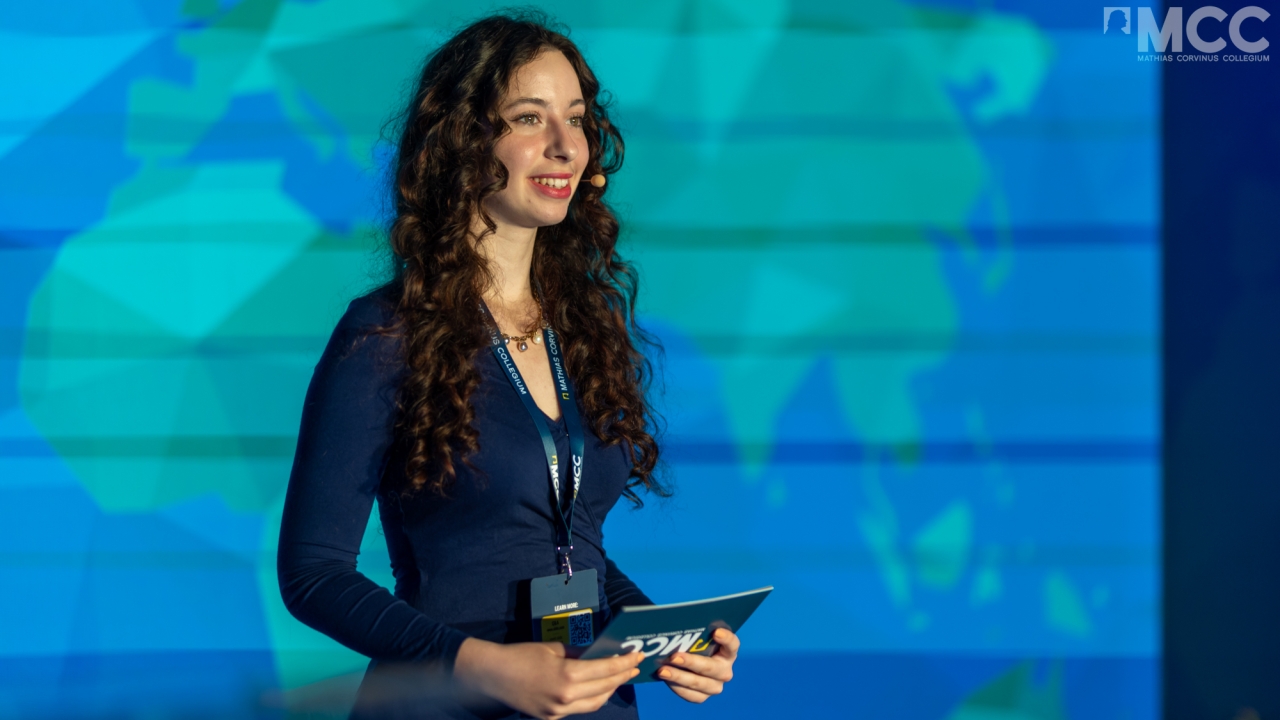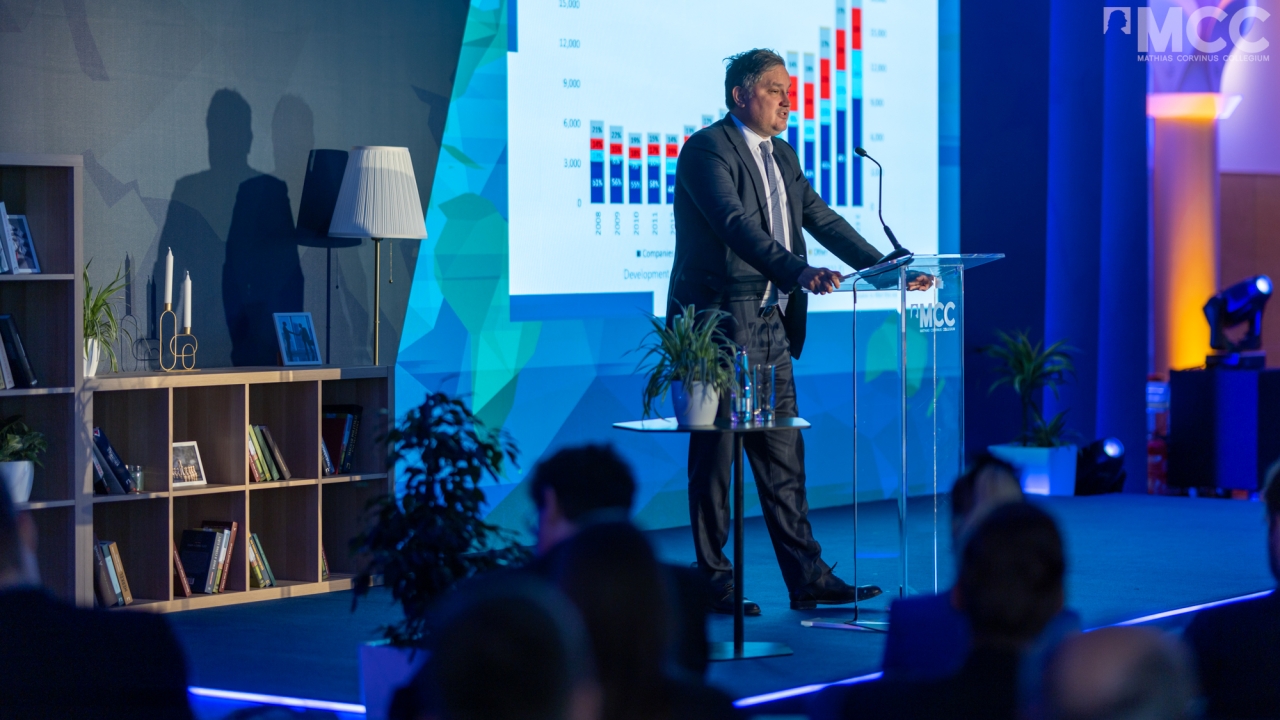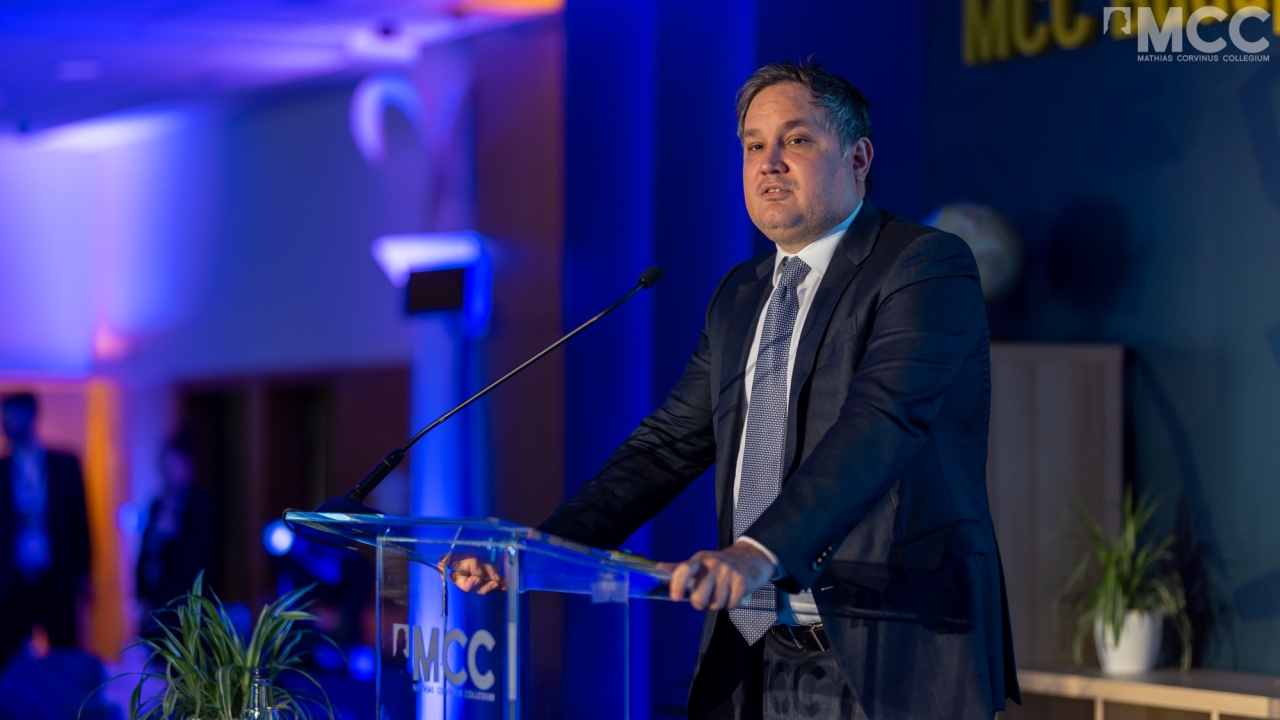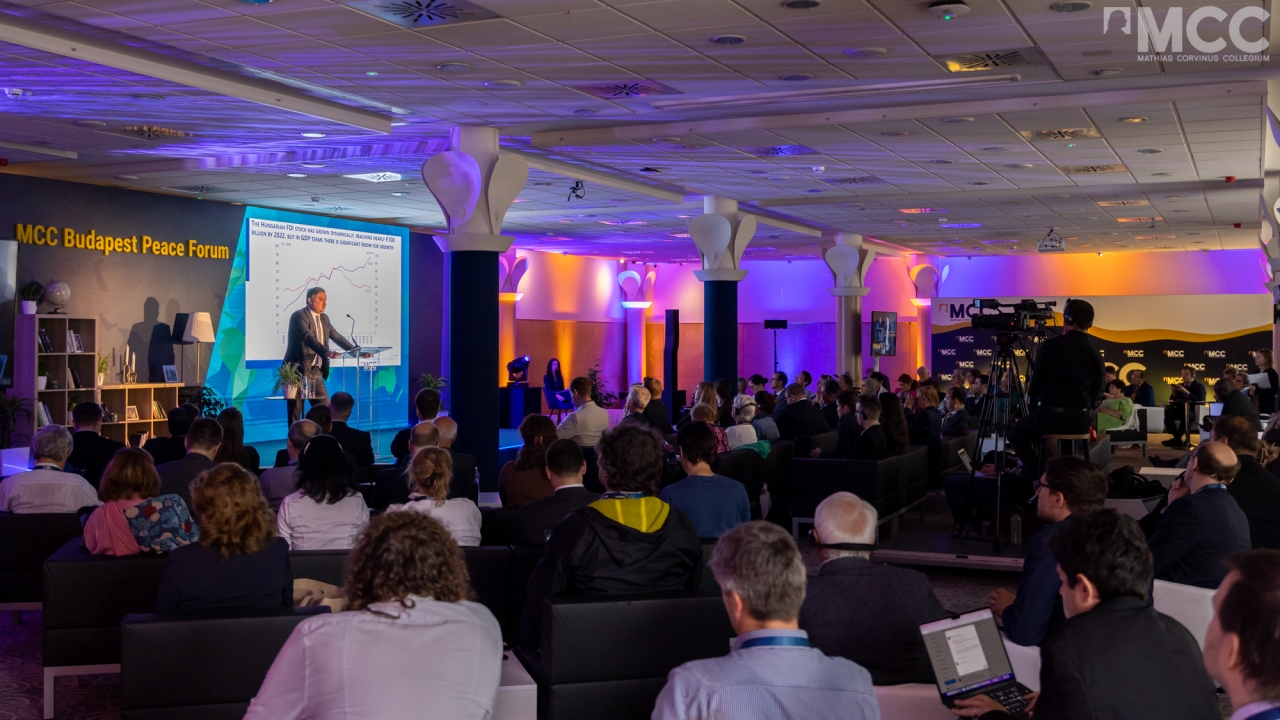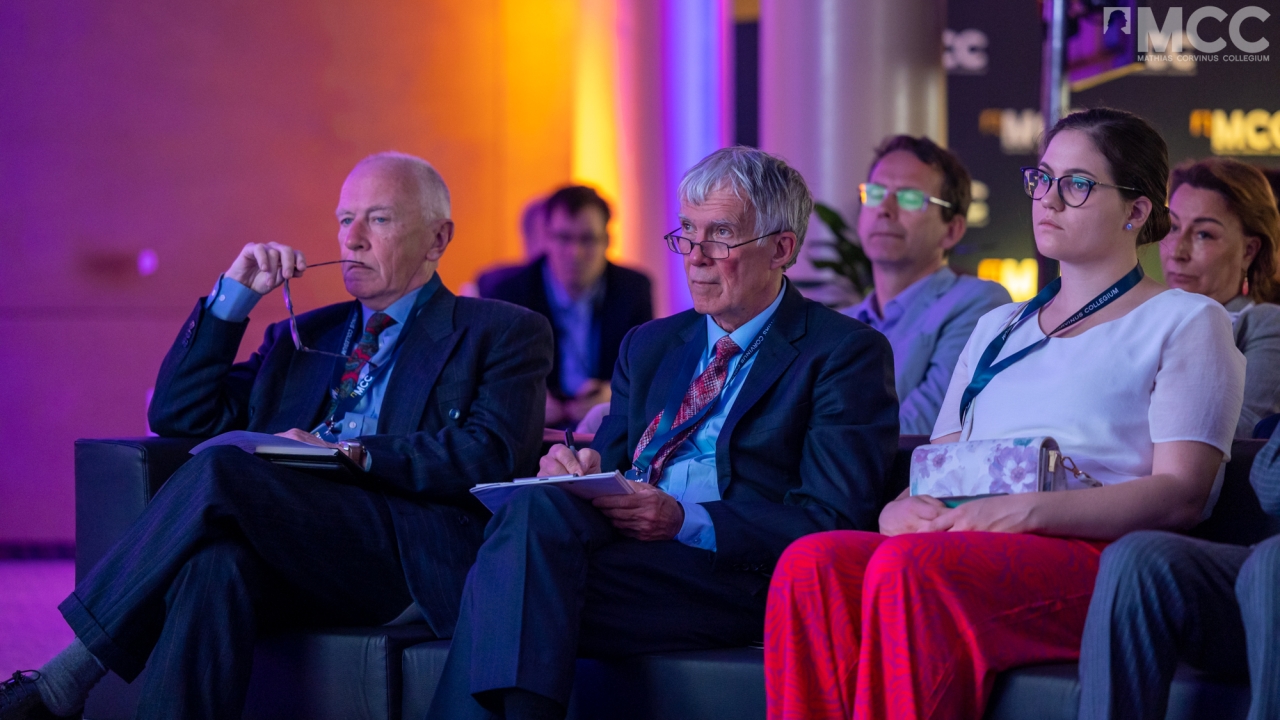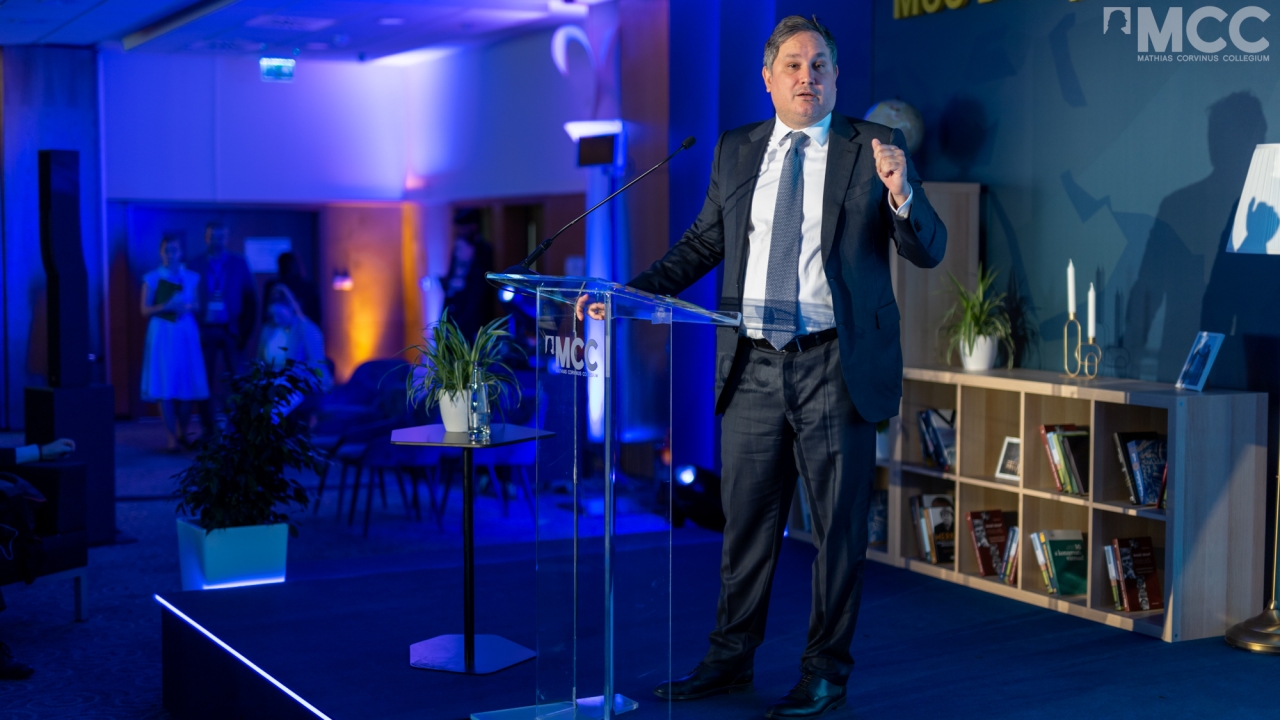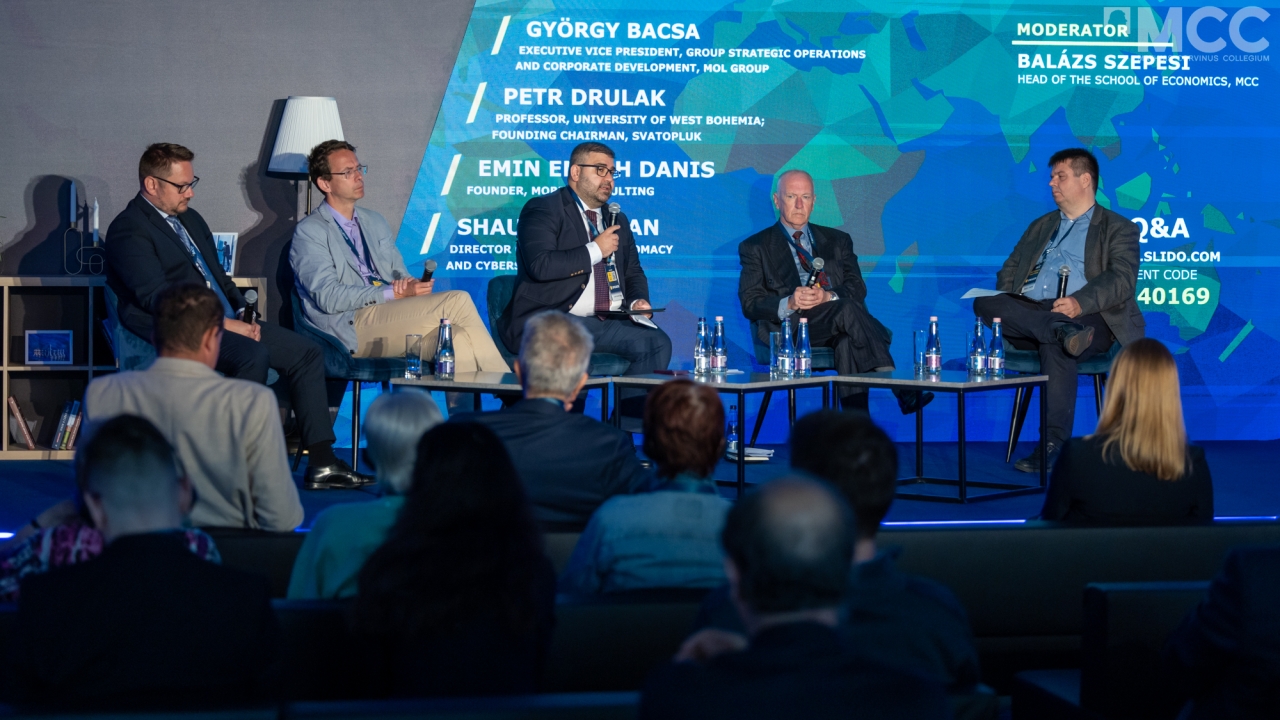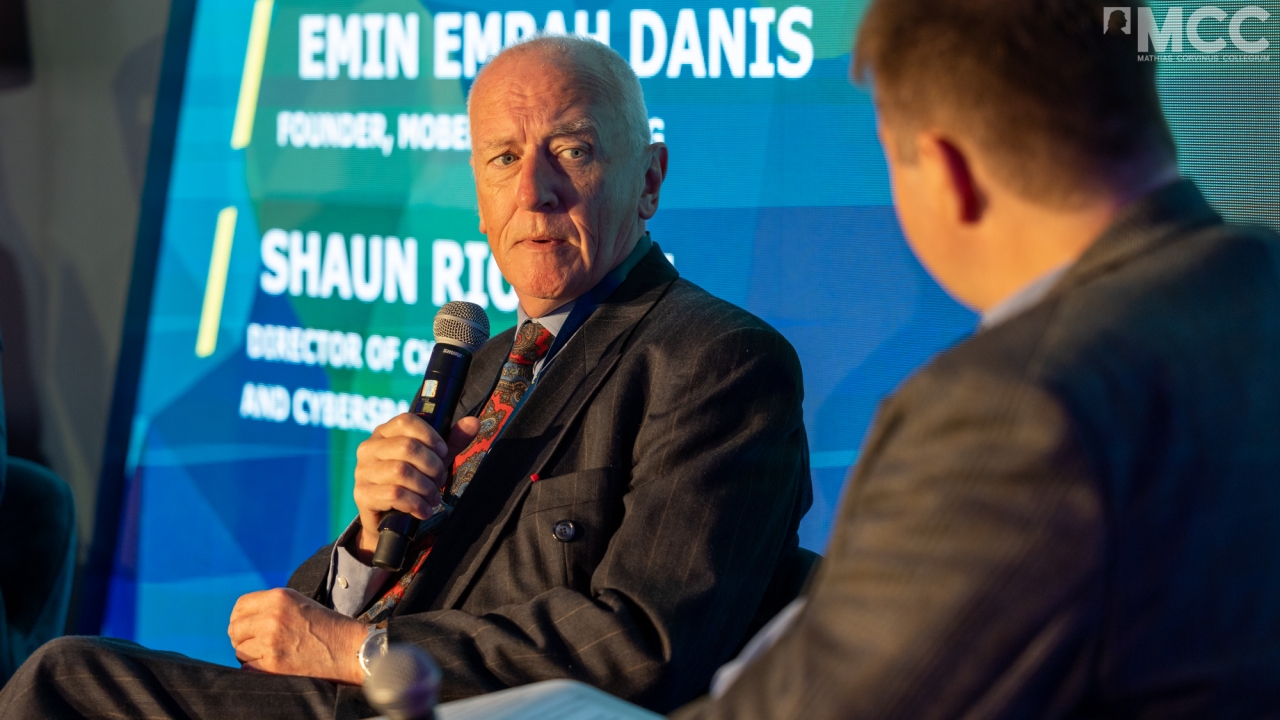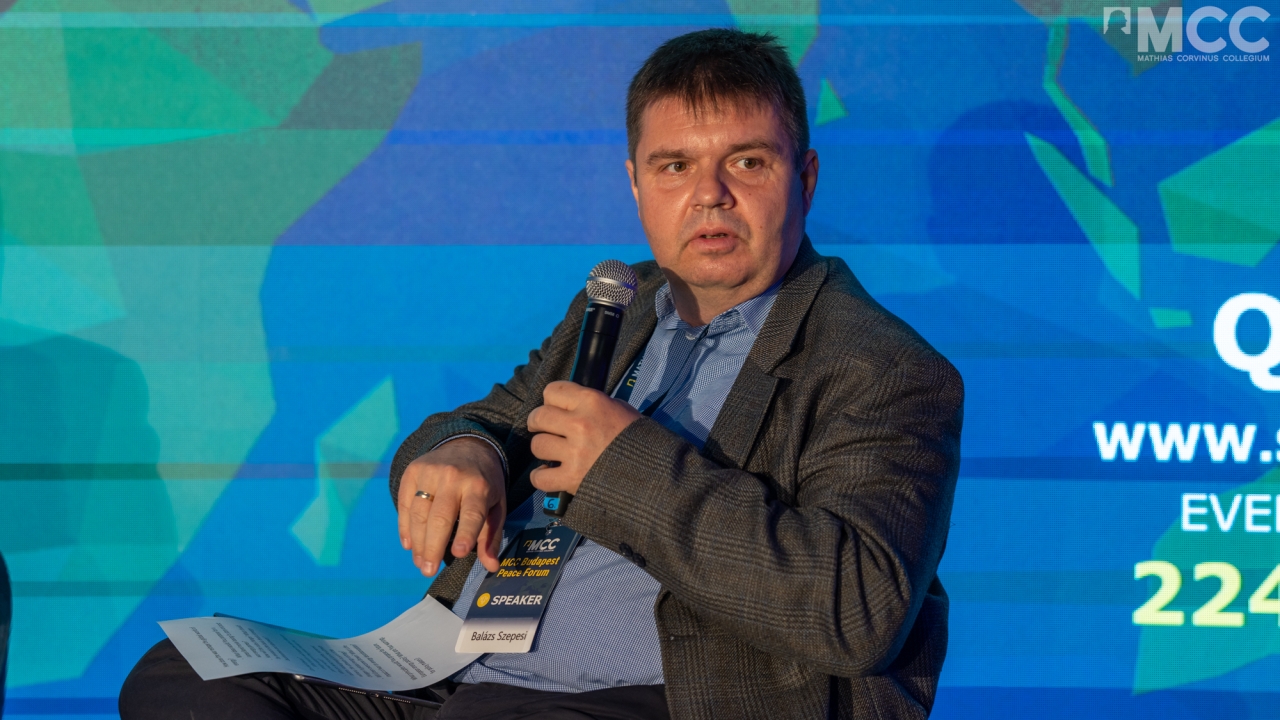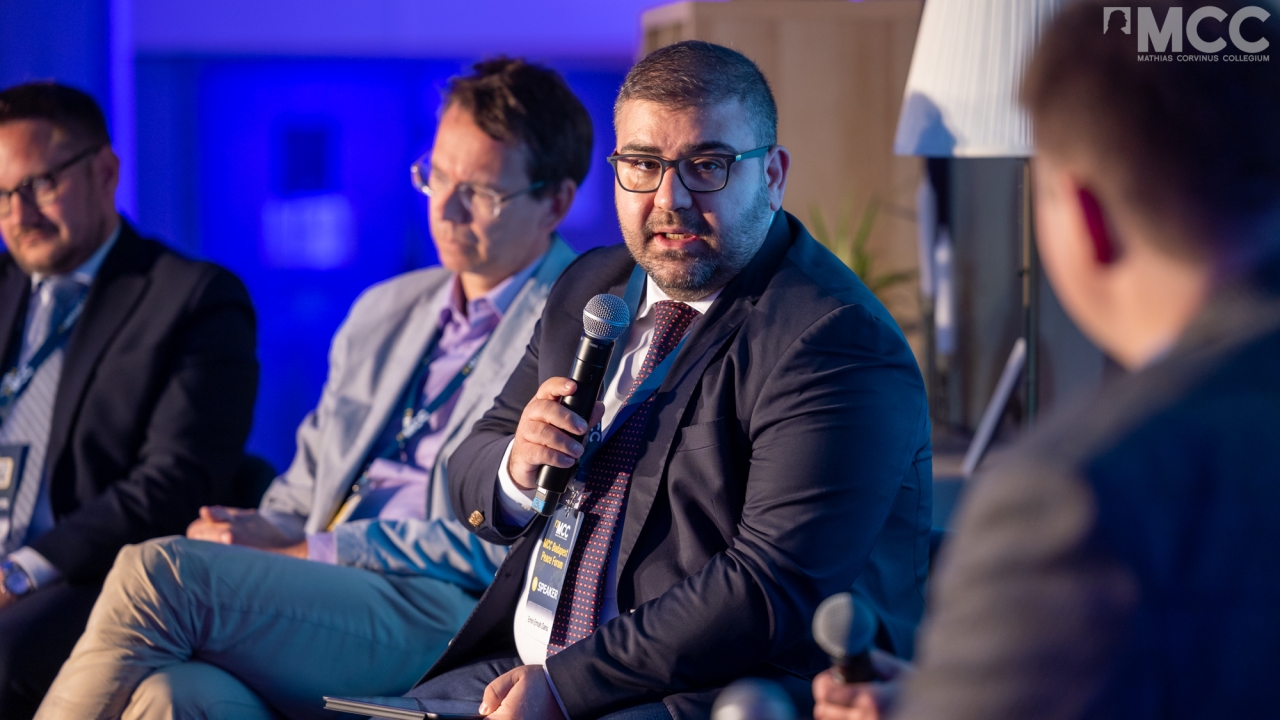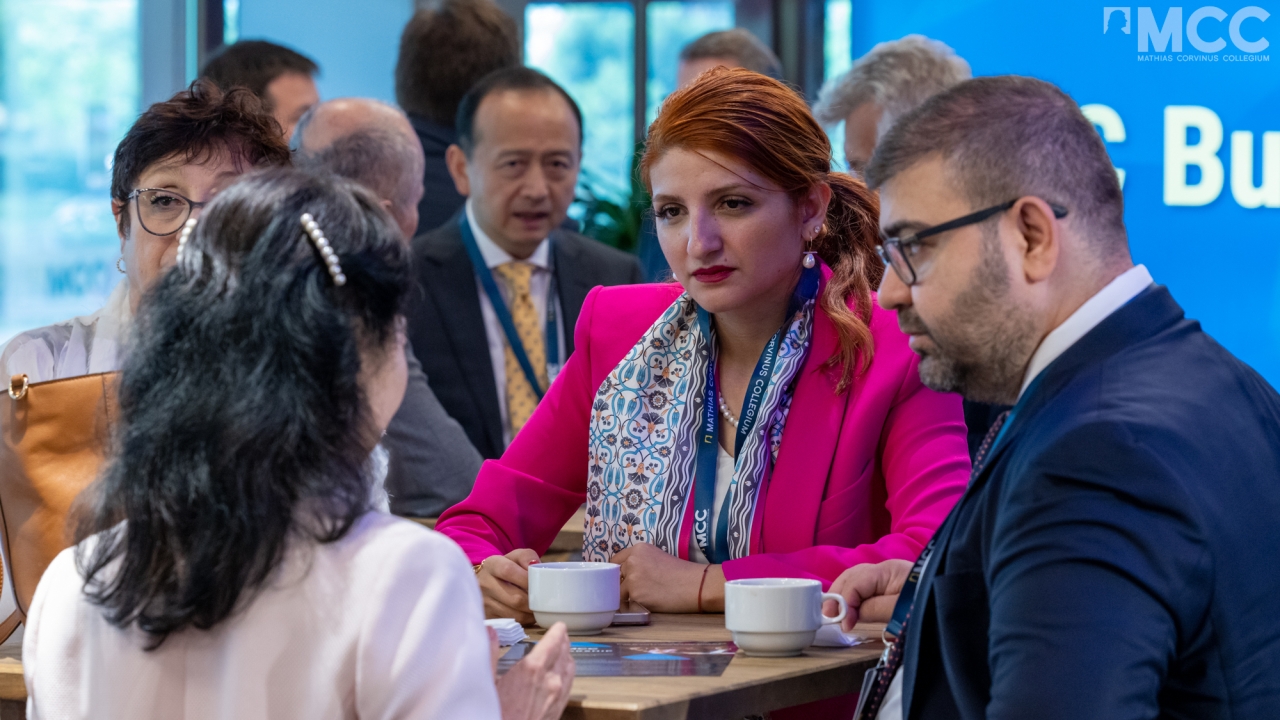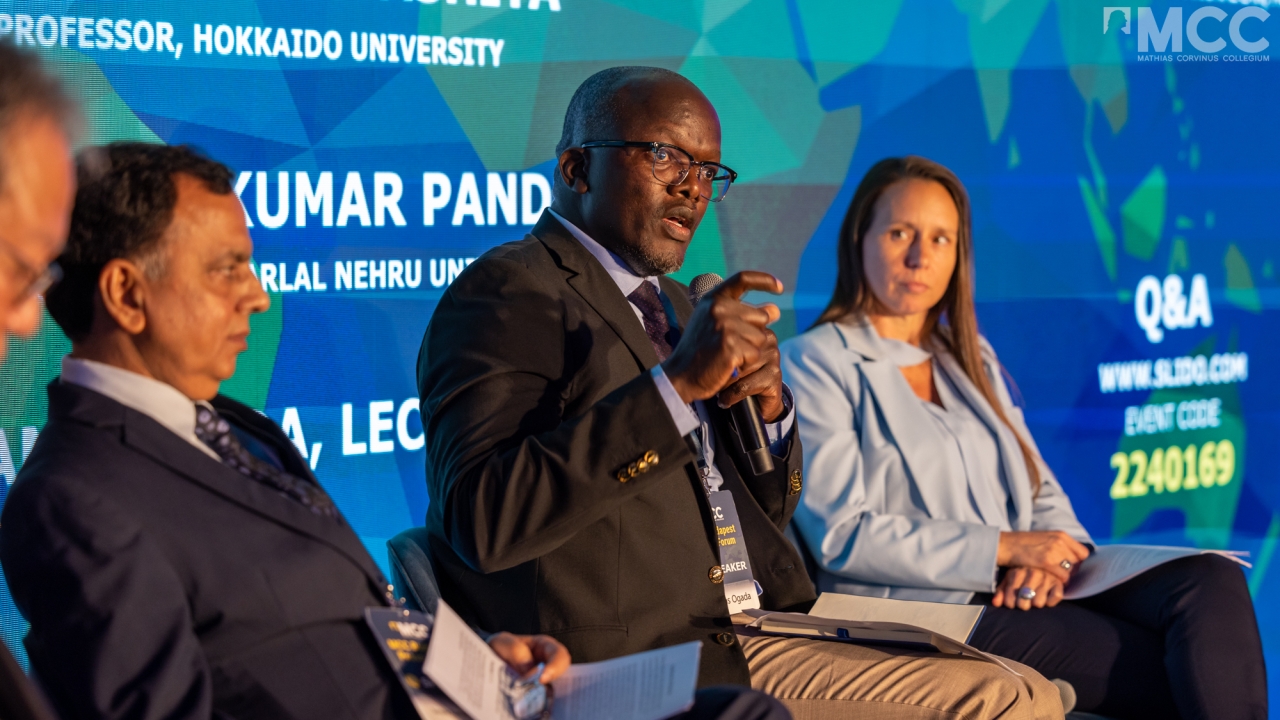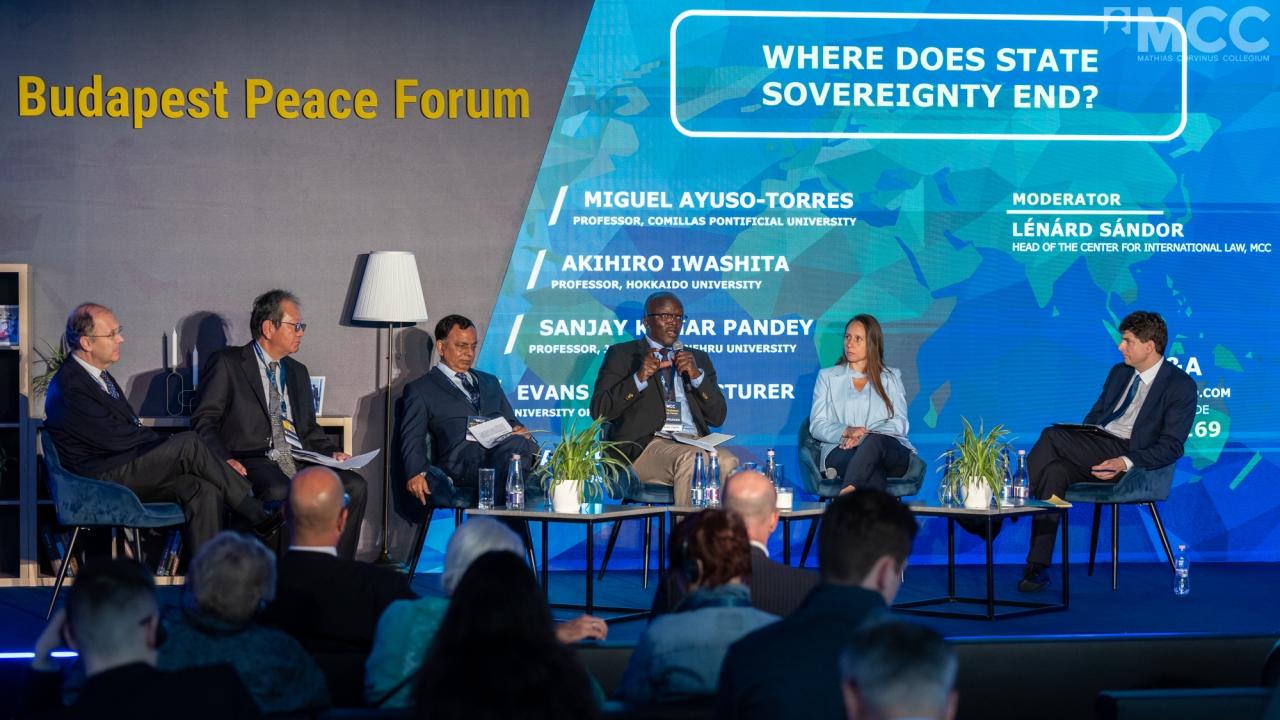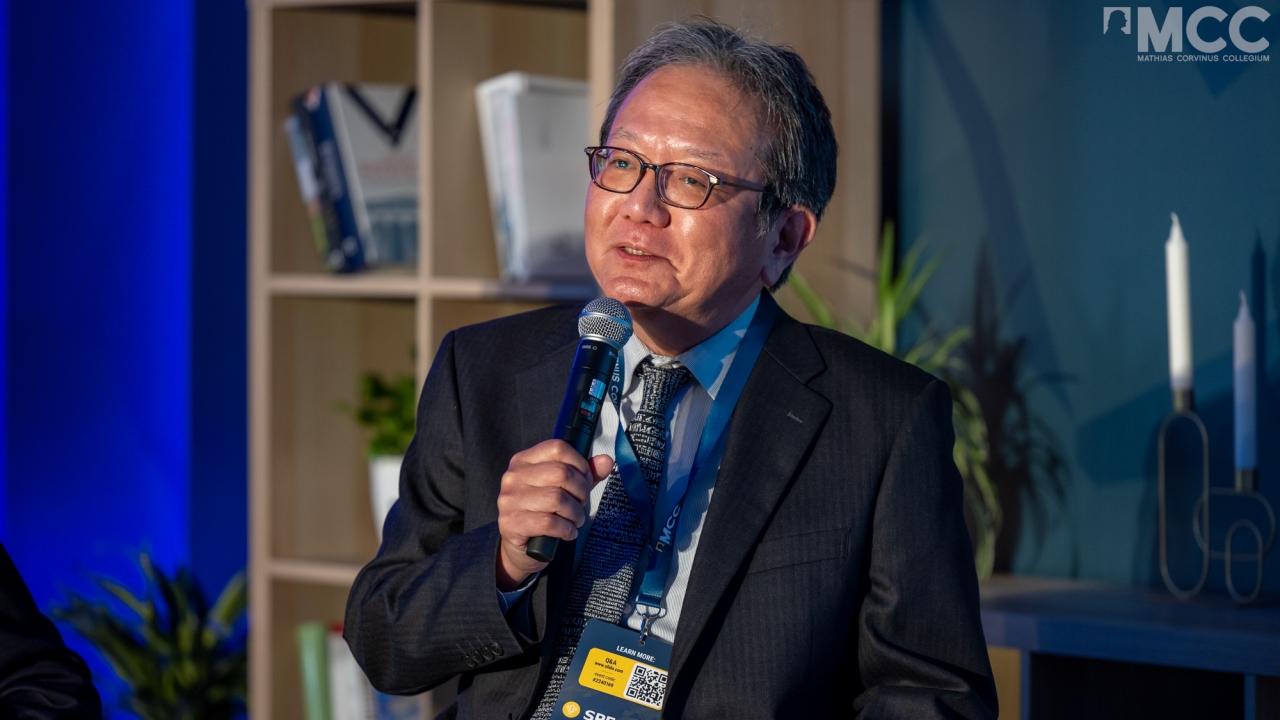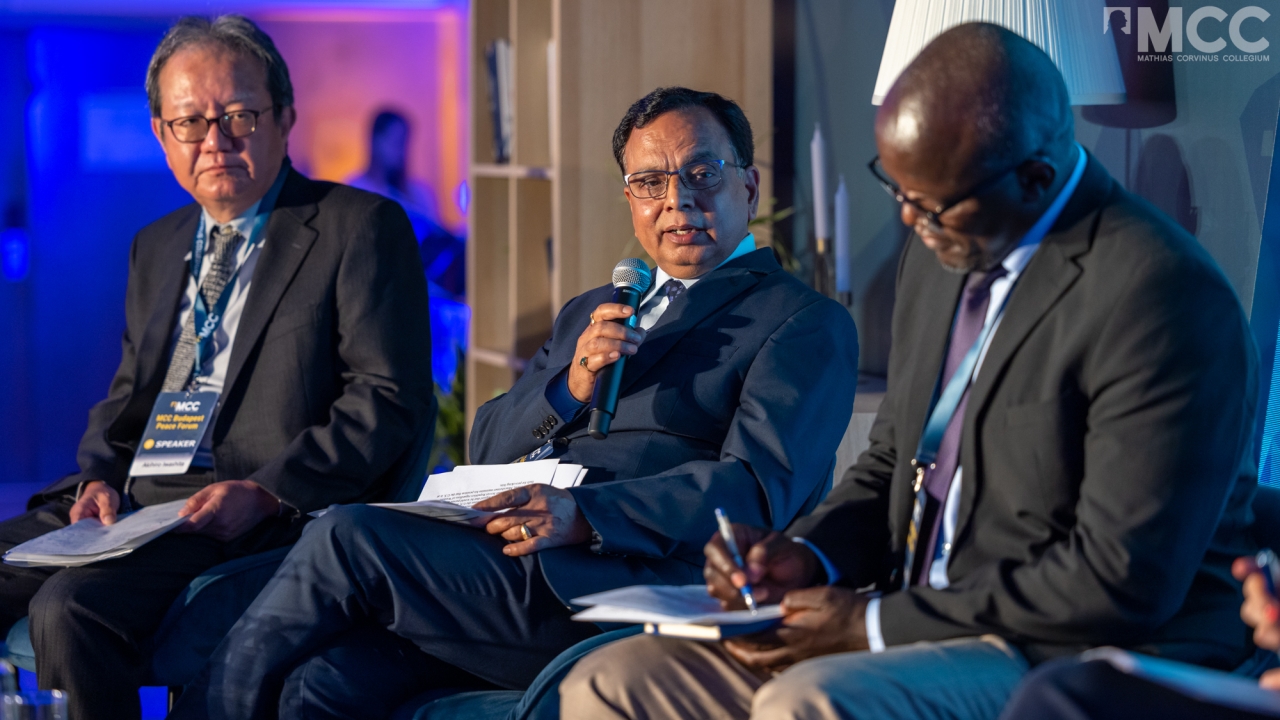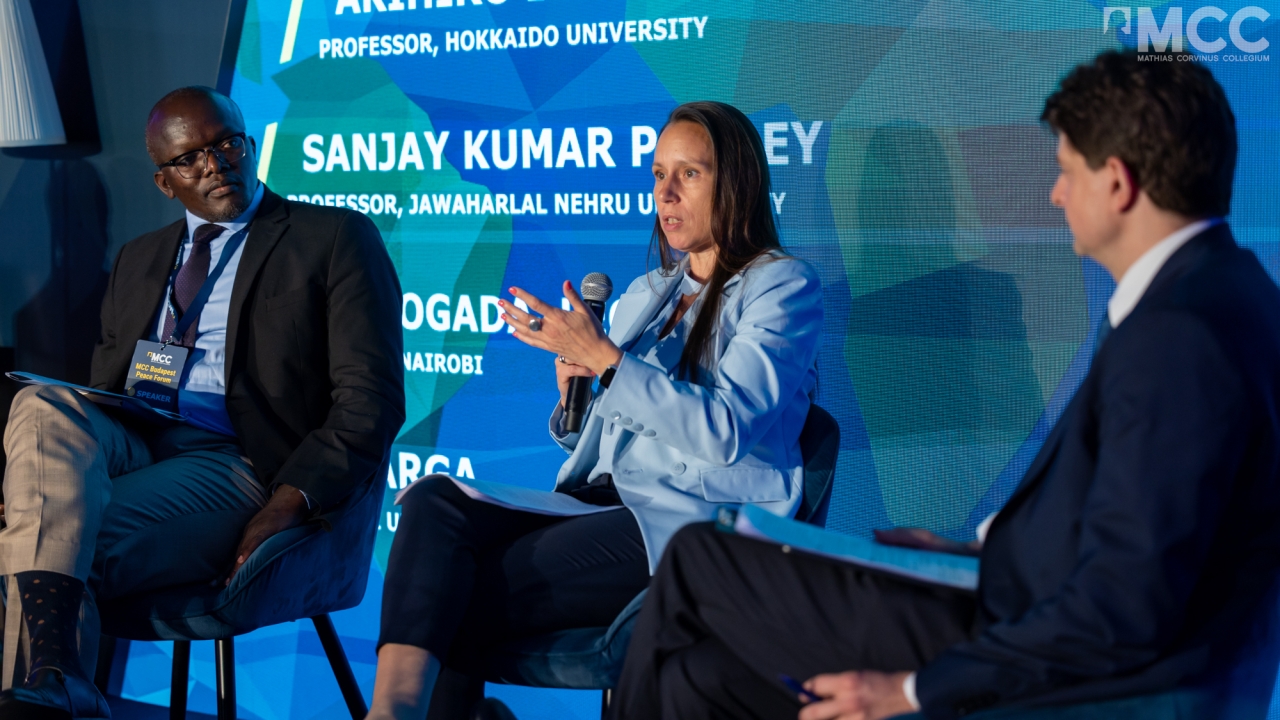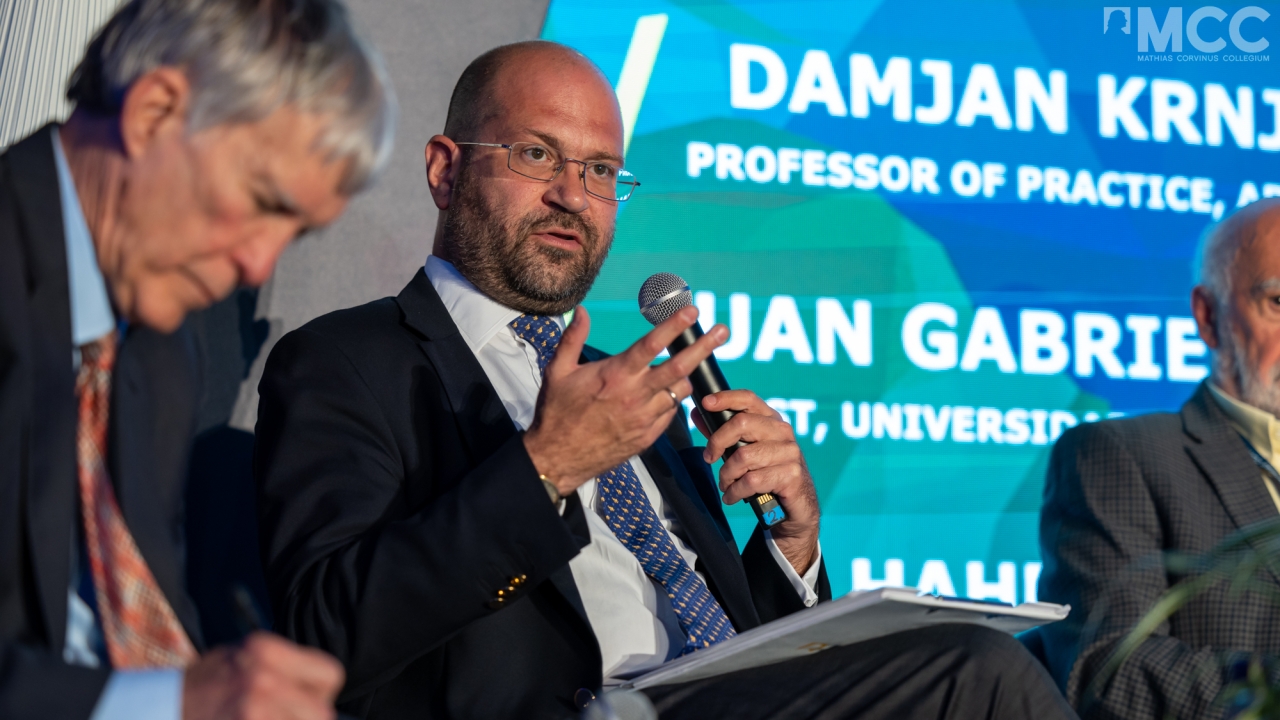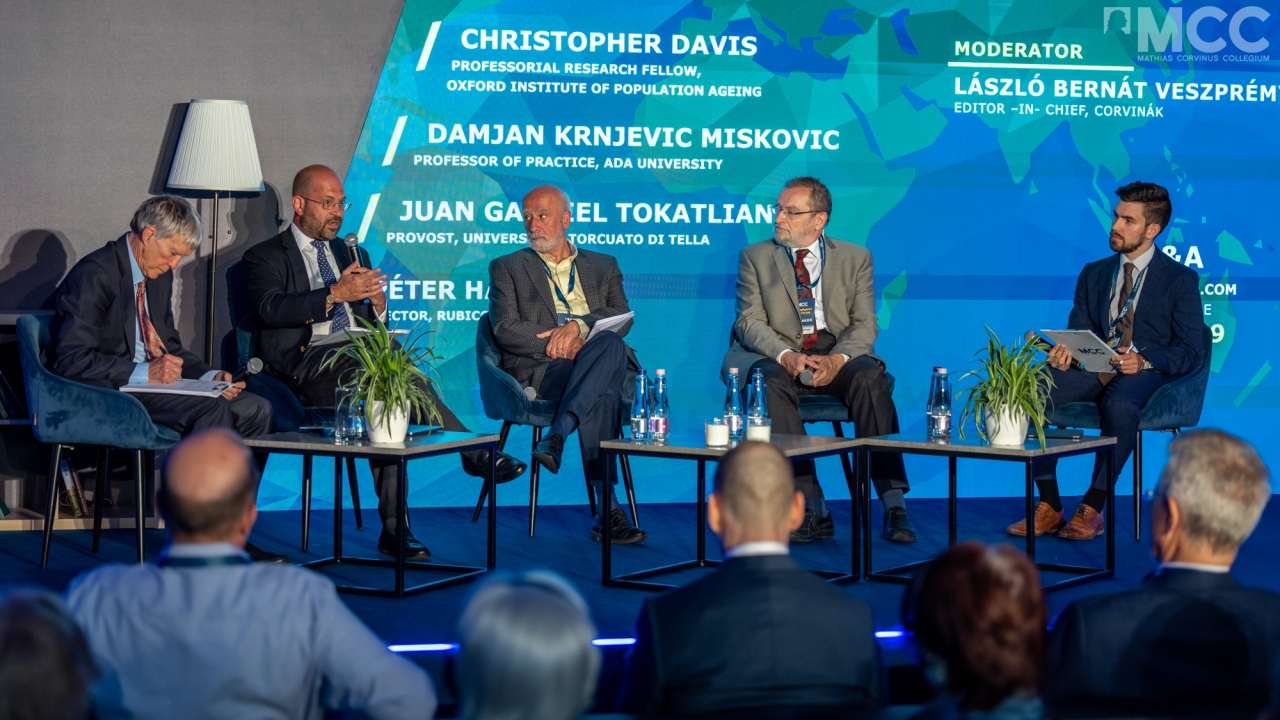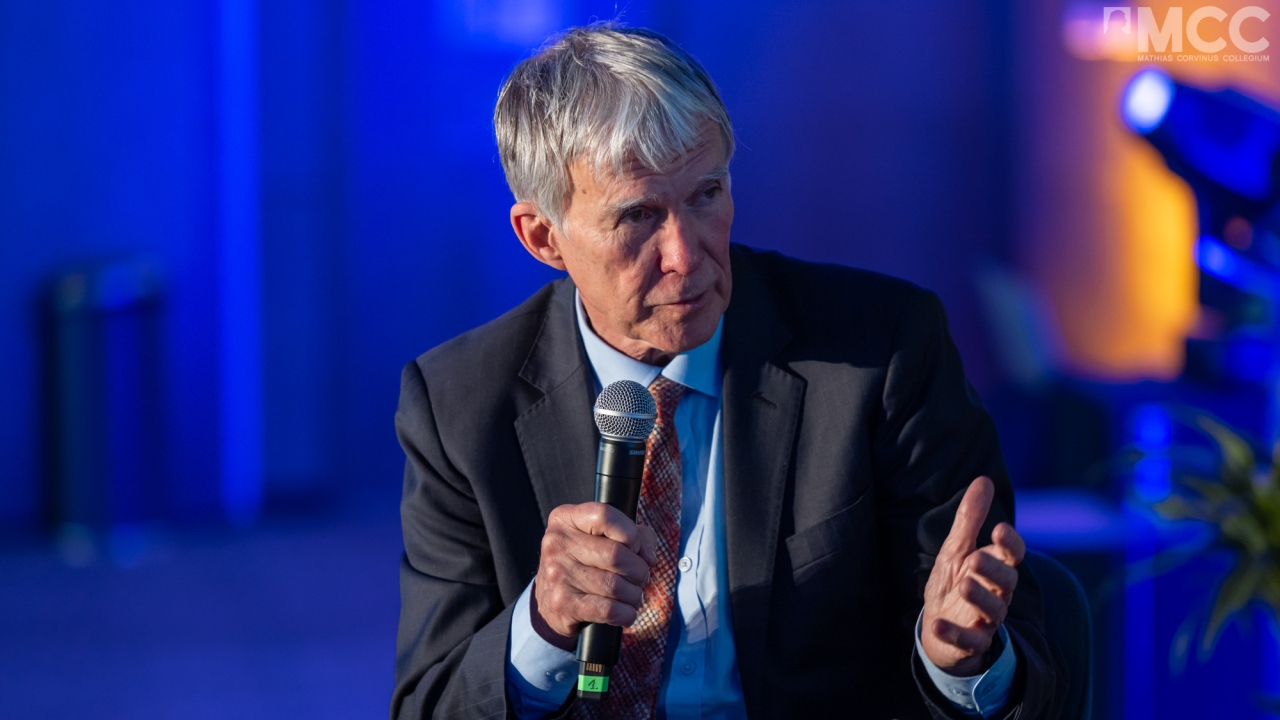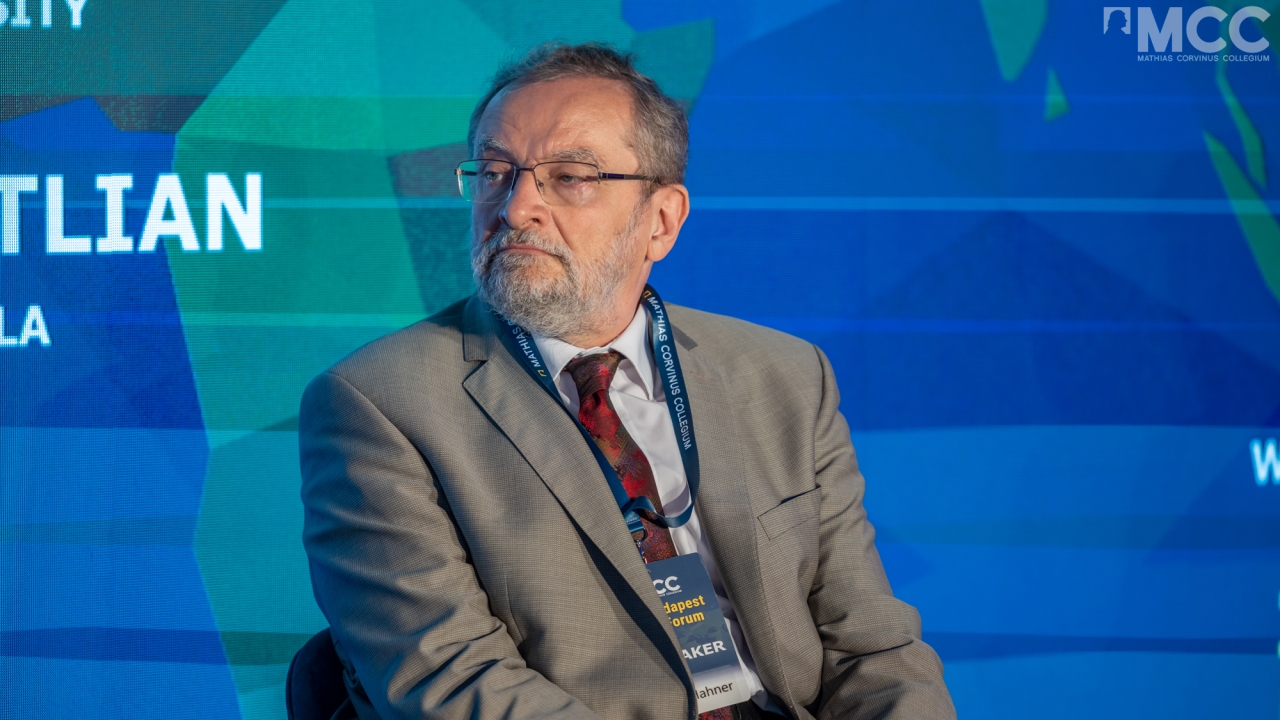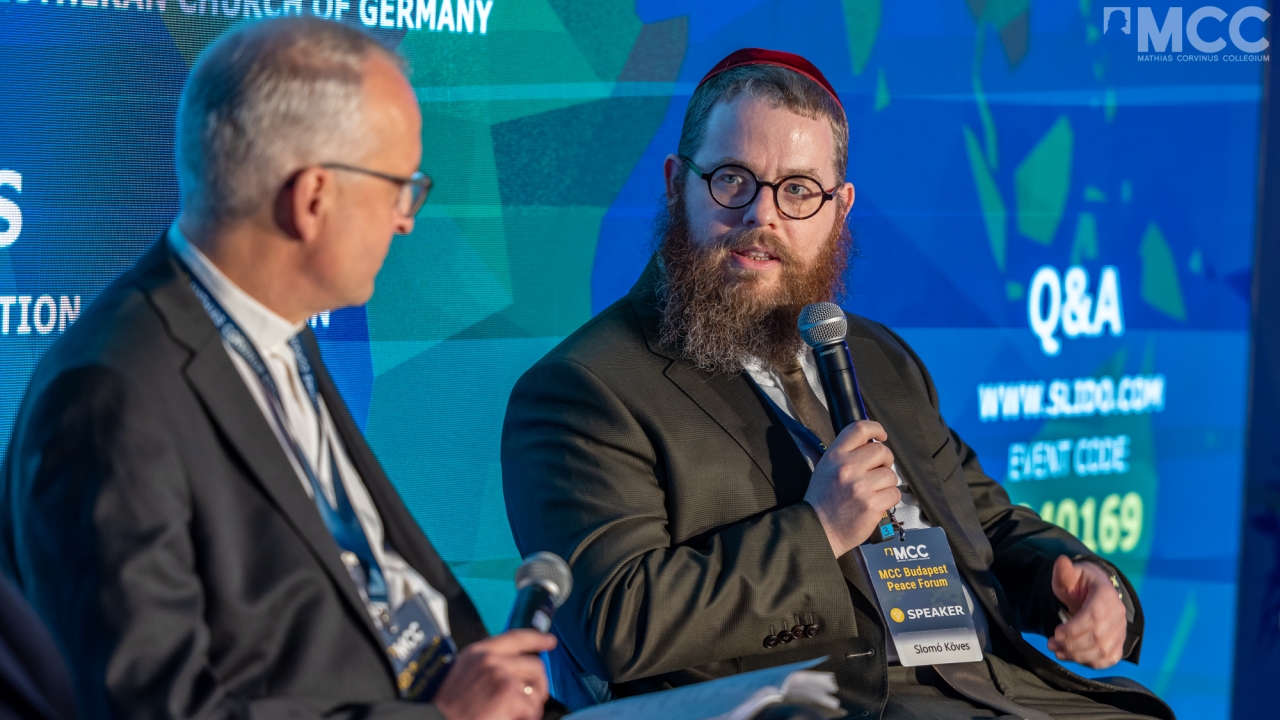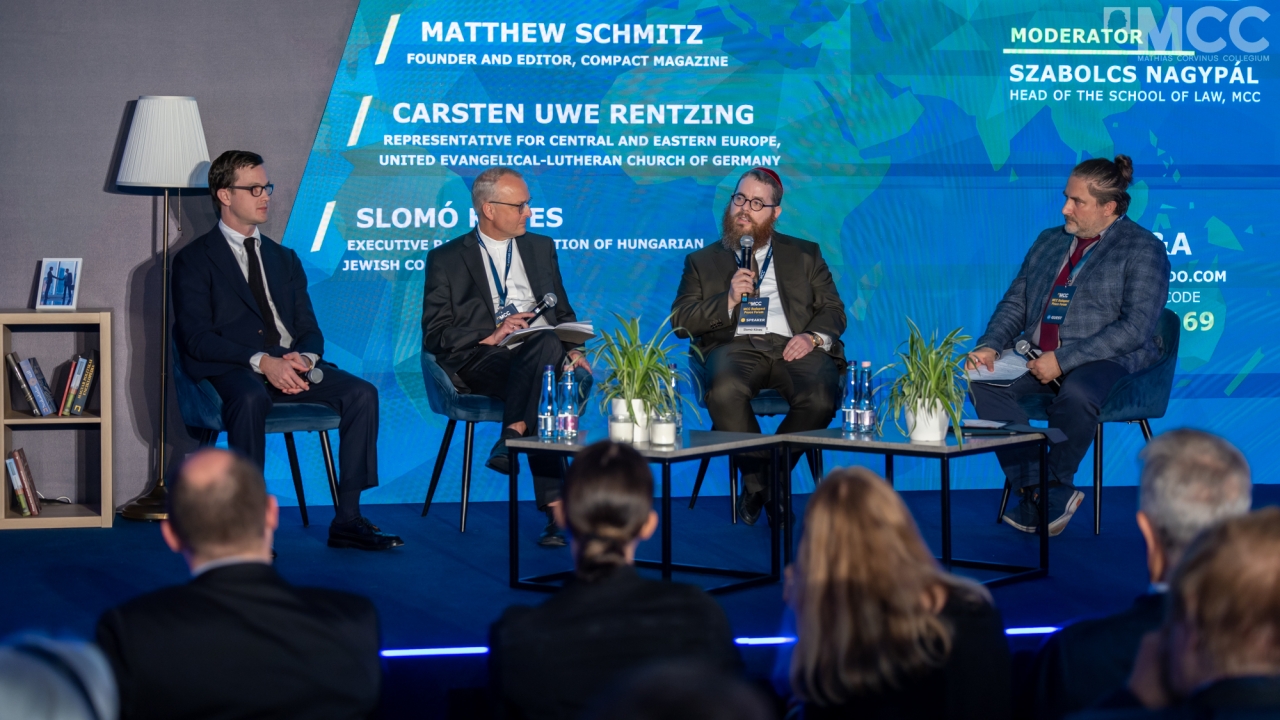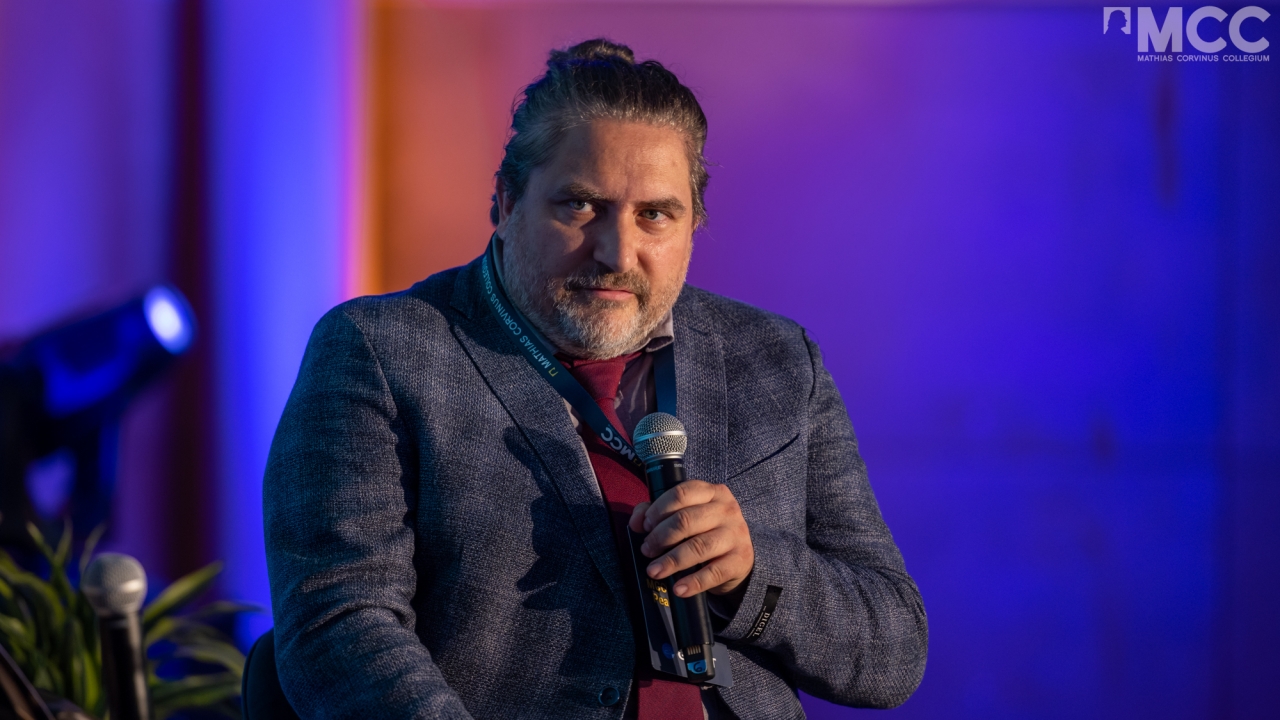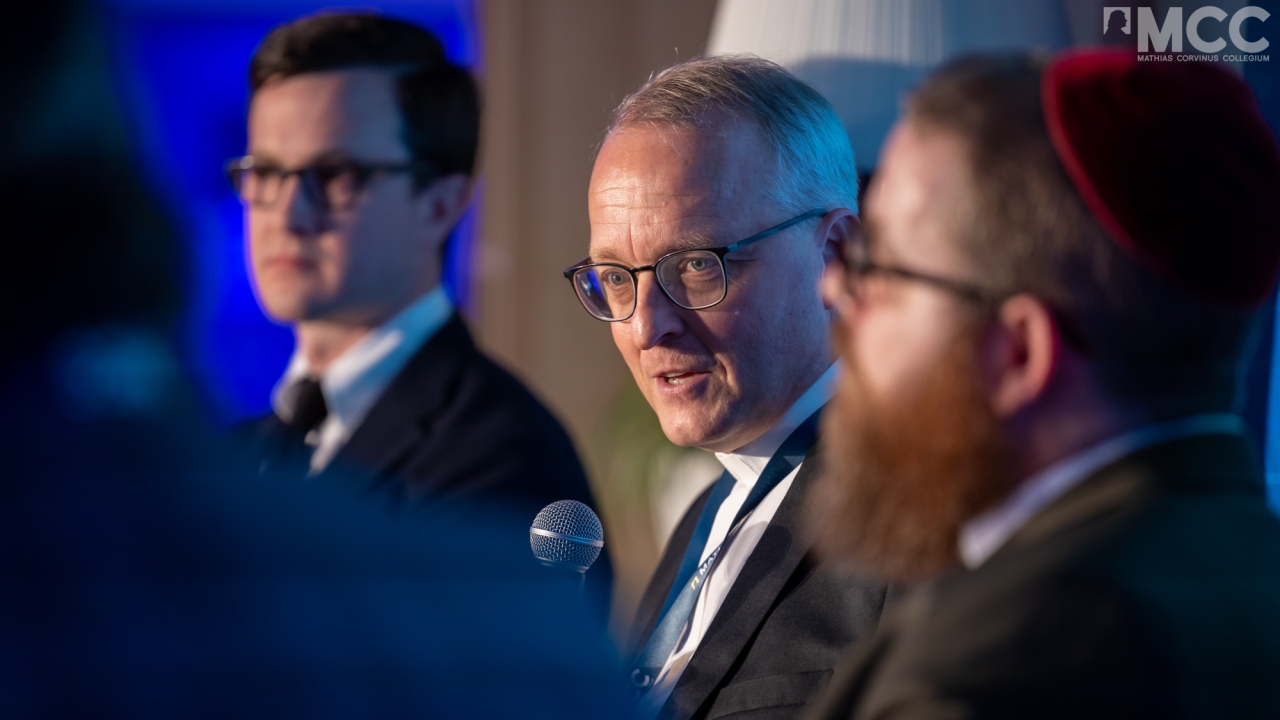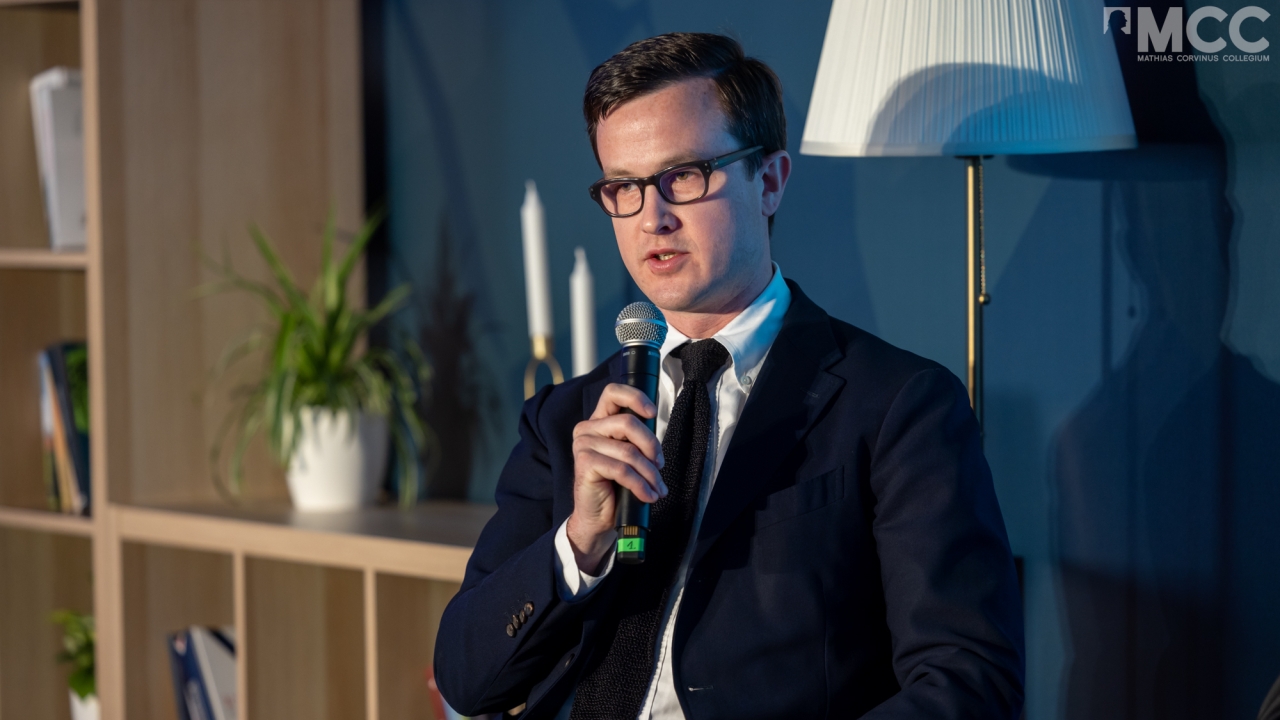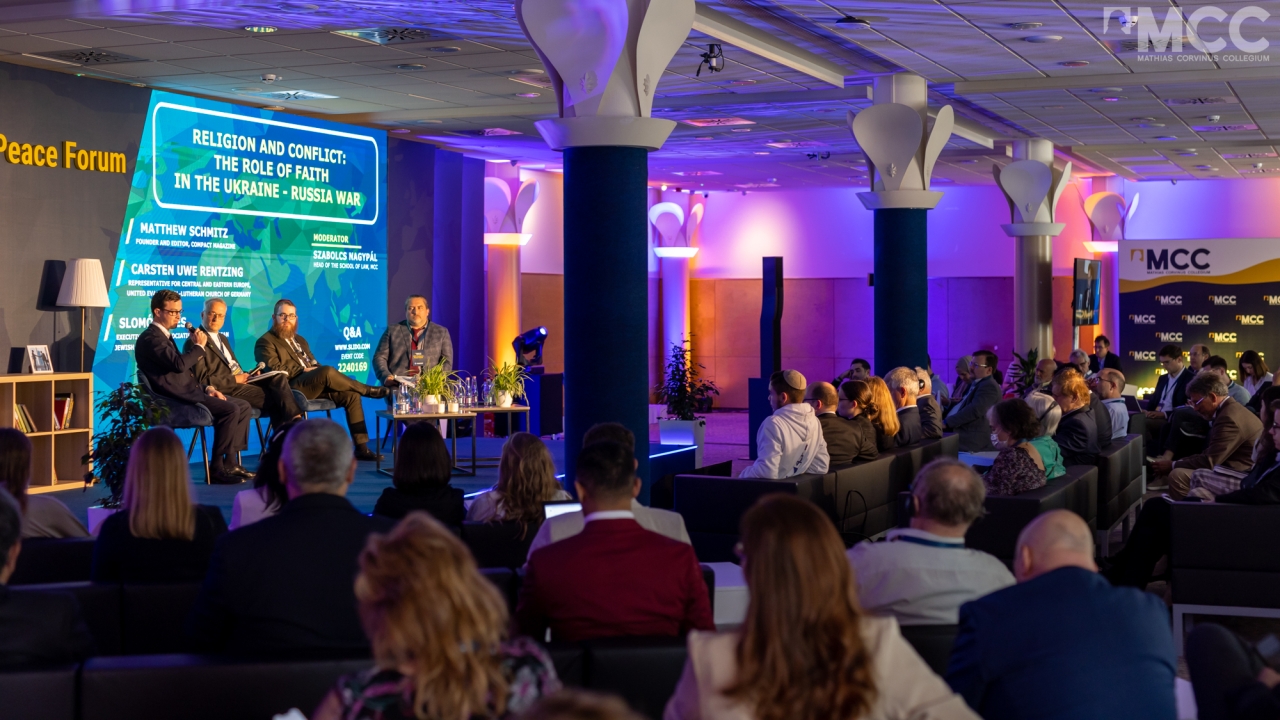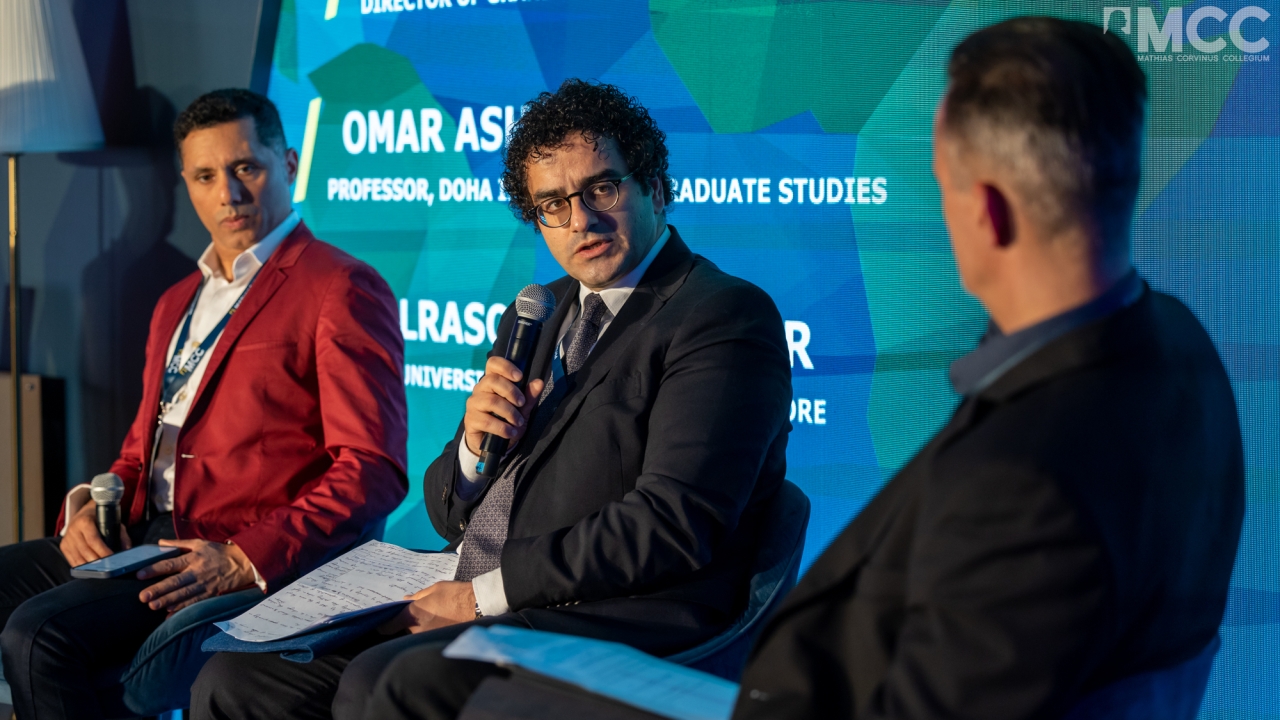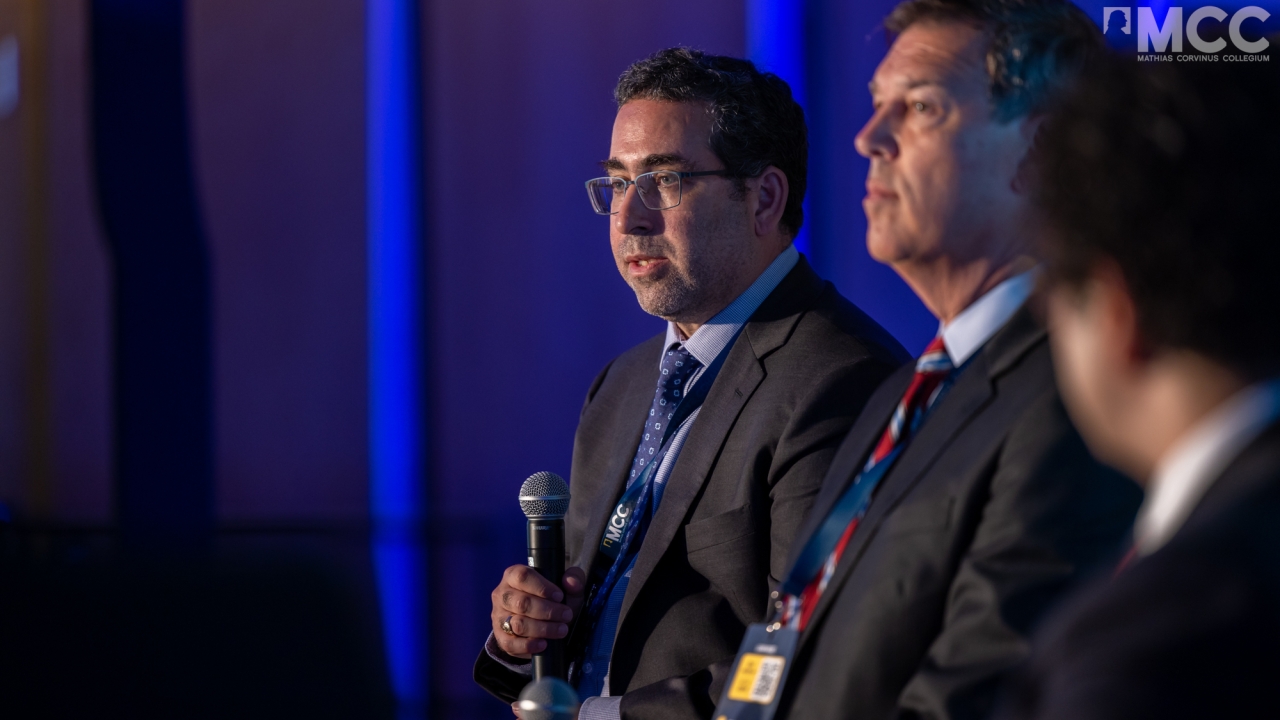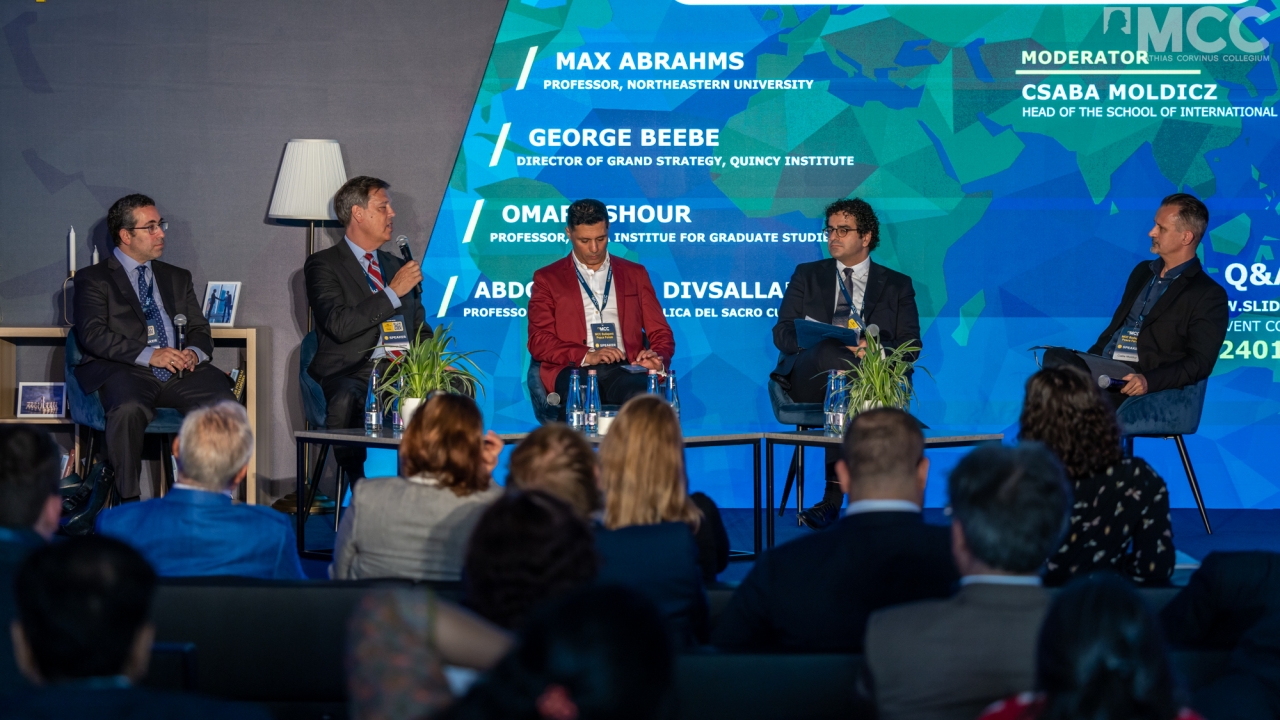Reading time: 11 minutes
70 speakers, 35 foreign experts from more than 20 countries, two cabinet ministers and nearly 400 attendees addressed the issue of making peace in Ukraine at a large-scale international conference organized by Mathias Corvinus Collegium. The MCC Budapest Peace Forum has been a unique conference not only in Hungary but also at the international level. After the successful first day, the conference continued with further exciting panel discussions.
The second day was opened by Márton Nagy, Minister of Economic Development who gave the keynote address. Talking about foreign direct investment in Hungary, the Minister said that Hungary's financing structure was changing. Although Hungary is essentially financed domestically, external financing is increasing in importance. He recalled that Hungary had one of the most open economies among OECD countries, ranking fourth overall.
According to Márton Nagy, there are two basic tasks facing the country's economic policy: attracting new capital investment to Hungary and increasing profitable reinvestment. The conditions are there, he argued, as Hungary offers an excellent investment environment and foreign-owned companies realize a return of 10% in Hungary.
Another outstanding achievement, the minister pointed out, is Hungary’s virtually full employment. However, he asserted, productivity and labor efficiency still need to be improved. He concluded his speech by outlining how the Hungarian economy serves as a bridge connecting West and East, as well as the domestic and foreign industries and service sectors present in Hungary.
The energy crisis is not the result of market problems, it is the result of EU policies
Emin Emrah Danis, founder of MOBEN Consulting, warned in the first panel discussion that with the war in Ukraine, the world has completely lost our energy stability. Mr. Danis speculated that while energy prices have normalized by the beginning of the year, the protracted war has left the situation uncertain, which may lead to a price explosion by the end of the summer.
Petr Drulak, Professor at West Bohemia University and founding president of the Svatopluk Association, pointed out that while Russia started the war, the energy war is, in fact, caused by Europe. The EU, he suggested, appears to be lulled into a sanctions policy and is unwilling to break away from it.
György Bacsa, Managing Director of MOL Group's Group Strategic Operations and Business Development noted that though the role of Russian energy sources has significantly decreased in Europe, the alternatives are not competitive. Current European solutions and import methods are expensive and cost companies more money, which is the reason why Europe is not competitive in the global market.
Shaun Riordan, Director of the Chair for Diplomacy and Cyberspace at the European Institute of International Studies, warned that European states are competing with each other for limited energy resources. The director asserted that LNG solutions are limited both in terms of accessibility and quantity delivered. The continent's energy security being at stake, there is a need for a change in energy policy. The main obstacle to this, he lamented, is that energy diplomacy and policy is based on ideology and not reality.
The special role of international law in war
Lénárd Sándor, Head of the MCC Center for International Law, and moderator of the panel discussion on the limits of state sovereignty opened the discussion by citing Cicero’s maxim "In times of war, law falls silent.” Experts on the legal aspects of war and peace, Réka Varga, Dean at the National University of Public Service, Evans Ogada, Lecturer at the University of Nairobi, Sanjay Kumar Pandey, Professor at Jawaharlal Nehru University, Akihiro Iwashita, Professor at Hokkaido University, and Miguel Ayuso-Torres, Professor at Comillas Pontifical University, all agreed that law, and international law in particular, plays an important role in the current conflict.
Réka Varga pointed out that besides the armed, physical war, there is also a legal war, since Russia had used legal arguments to justify the start of the war. Dr. Varga concluded that international law would probably not be able to resolve this conflict, but it could at least provide a framework and that mediation can be a starting point, provided that both parties accept the mediating state.
Evans Ogada argued that all states like to be seen as a kind of moral authority in the context of a conflict, and sometimes, they want to prove that they are acting in accordance with the law. Russia had already violated international legal norms of sovereignty and territorial integrity at the outbreak of the conflict.
Sanjay Kumar Pandey took a geopolitical approach to the issue, and recommended that the Russian perspective on the war needs to be considered. From their point of view, the US and the West have violated many previous agreements and with the perspective of further eastward enlargement of NATO, the West corners Russia, undermining the security of the country.
Miguel Ayuso-Torres argued that war and law are compatible. Furthermore, he pointed out, the current conflict is type of total war, beside the armed conflict, there is an economic and legal war as well, where the law is used as an instrument of war by individual states.
Akihiro Iwashita argued that, in many ways, the conflict could be described as a Cold War 2.0 and that both the post-World War II and the post-Cold War international systems are called into question, presenting a double challenge for the world. According to the professor, after 30 years of relative stability, many uncertainties have emerged, and the world is faced with a crisis even in international law.
How to find an early solution to the conflict - examples from history
The ninth panel discussion of the MCC Peace Forum focused on the complexity of history and the impact of historical events on the Russian-Ukrainian war.
Péter Hahner, Director General of Rubicon Institute, opened the discussion by answering the question: what has history taught us? “Judging by the current conflict, nothing”, he further explained his view that when studying history, we only learn what we want to remember and that the history of mankind is so complex that states are focusing on their own perspective and interest. Regarding an eventual peace agreement, Péter Hahner noted that a lasting and successful peace could only be achieved if the losers are not punished too severely and are treated as future partners.
Christopher Davis, a researcher at the Oxford Institute of Population Ageing, outlined the possible outcomes of the war based on his research into the 20th century. He speculated that there might be a total victory, as in the Second World War, or a war of attrition, as in the case of the conflict between North and South Korea, which may lead to a ceasefire. A frozen conflict, he explained, may result in an implicit ceasefire as in the case of the Nagorno-Karabakh conflict between Armenia and Azerbaijan. The fourth and best scenario, Dr. Davis asserted, is when hostility between the two parties ceases and is how all conflicts ideally should end.
Damjan Krnjevic Miskovic, Lecturer at Ada University, cited the example of the conflict between Syria and Israel, where the two countries have not yet resolved their differences, and they have been in a state of truce for more than ten years. This is far from being an ideal situation, however, the parties involved have learned to live with the lack of a formal solution. Alternative solutions exist - such as a referendum - but, sooner or later, a compromise must be reached, and the war must be put to an end. This is also true for Russia and Ukraine. As the possibility of Russia resorting to nuclear weapons cannot be ruled out, an early solution must be found to ease the tension.
Juan Gabriel Tokatlian, Dean at the University of Torcuato Di Tella, said that in the context of war and peace, it is also worth exploring the question of how to avoid war. The expert enumerated three main approaches: regional dialogue, third-party mediation, and international arbitration. The successful use of these approaches has allowed South American nations, fighting the least number of wars in the last 200 years. War, in and of itself, is a problem, he declared, the greatest victory is in avoiding the conflict.
Peace is a core value of the Christian and Jewish Faith
The next panel addressed the Russian-Ukrainian war from a religious perspective. At the beginning of the discussion
Carsten Uwe Rentzing, the representative of the United Evangelical Lutheran Church of Germany in Central and Eastern Europe, stated that peace is a core value of the Christian faith. He also pointed out that war does not come from God, as only life comes from God, as exemplified by the teachings of Jesus. Talking of peace, Carsten Uwe Rentzing noted that peace is not just the absence of weapons. Peace must be just and based on the balance of interests and focus on the wellbeing of the population.
Matthew Schmitz, founder and editor of Compact Magazine, gave a Catholic assessment of the question. He highlighted the role of Pope Francis, who was one of the first to call for an end to the conflict and the start of peace negotiations. When Matthew Schmitz voiced his opinion that he saw little chance for a just peace, Slomó Köves replied that only God can grant perfect peace. If God is not present, only compromises can be reached. However, they agreed that any kind of peace or ceasefire is better than people being killed and God suffers with those who suffer and is omnipresent.
Slomó Köves, Chief Rabbi of the United Hungarian Jewish Congregation, mentioned that while there are many wars described in the Bible, they represent a particular situation at a given time, and should not be considered as examples to follow, but rather as metaphorical lessons. He pointed out that, according to Talmudic law, violence or war is only an option if it is done in self-defense. Slomó Köves reminded the audience that nowadays we often forget that behind the statistics and news of the war, there are personal tragedies unfolding.
Avoiding nuclear escalation is the collective responsibility of the nuclear powers
George Beebe, Director at the Quincy Institute, warned that nuclear escalation is a very real threat. He also called attention to the fact that from the Russian perspective, one of the main reasons for the outbreak of the conflict in Ukraine in 2014 was Russia’s desire to avoid the port of Sevastopol in Crimea becoming a NATO base. The expert also shed light on the deterrence strategy of Russia, which believes that history shows that an aggressive power(in Russia’s view, NATO) can only be stopped if it is confronted by a larger, stronger adversary. The director concluded that only diplomacy can find a way out of the conflict and that although there is a chance for escalation, this does not necessarily mean the use of nuclear weapons. Avoiding nuclear escalation, he declared, is the collective responsibility of nuclear powers, as the fate of humanity depends on it.
Max Abrahms, Professor at Northeastern University, noted that while nuclear weapons are very important to discuss, he sees little chance of them being used, arguing that Russia has no interest in further escalation or a direct war with NATO. However, he conceded, recourse to nuclear weapons cannot be ruled out, even if all parties to the conflict are rational actors. Dr. Abrams stressed that while peace is much needed, in light of the behavior of the belligerent parties, it seems to be difficult to achieve. The US expert noted that a cornered adversary is much more likely to escalate the conflict.
Abdolrasool Divsallar, Professor at the Catholic University of the Sacred Heart, similarly does not see any chance for the use of nuclear weapons. Despite the Russian President putting the Russian nuclear arsenal on the highest alert level, the expert stated there are no tangible signs of the intention to using it.
Omar Ashour, Professor at the Doha Institute for Graduate Studies, argued Russia's deterrence strategy has been successful, as there are no NATO troops in Ukraine. The expert reminded the audience that the conflict has been going on since 2014, and Western leaders, led by Barack Obama and Angela Merkel, convinced the Ukrainian leadership that the lost Crimean territories could be regained through diplomacy and sanctions policy.
The MCC Budapest Peace Forum will continue with presentations and discussions held at various Mathias Corvinus Collegium regional centers in the Hungarian countryside.
